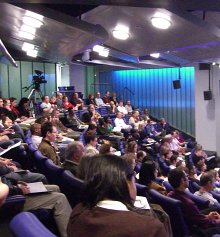Call for new digital programmes

Howard Kiedaisch presents his views on digital distribution. (Picture: Tony Scott)
Quality content and new programme forms have been called for at BECTU's digital distribution evening.
The well-attended New Media and Future Distribution Opportunities event, held at the BT Newgate Street office, featured an invited panel discussing digital platforms and the future of film and television.
Howard Kiedaisch, Arts Alliance Media Chief Executive Officer, looked at digital distribution to cinemas and the home.
He argued one of the main benefits of digital cinema for distribution was the media not wearing out - unlike film prints.
He said the DCI standard, agreed in 2005 following three years of discussion between Hollywood studios, meant there was a common system leading to "real take up" with a 250% growth year on year.
Arts Alliance Media is involved in building the Arts Council Digital Screen Network. The equipment for the 240 screens is projected to be installed by the end of May this year.
Home distribution
On distribution to home Kiedaisch said that Warner Brothers launched the first internet commercial distribution system in 2005, and they already have 1,000 titles available, projected to increase to 10,000 within two years.
He said the "big players" in the UK are:
- Amazon - launched an internet distribution system in the US which is expected to be rolled out in Europe shortly iTunes - already have 80% of the music market and are moving into film
- Sky - looking at launching an internet distribution network
- BT - have a closed set top box distribution system
The market is expected to expand from its current yearly £300m to £1bn in five years time said Kiedaisch.
The important growth factors over the next few years will be broadband expansion, media enabled PCs, portable players, and the widespread use of PCs and laptops for viewing by the young in preference to using traditional television displays.
The producer's perspective
Philip O'Ferrall, Managing Director of Two Four Interactive, looked at impact of digital distribution from a television producer's perspective.
He said the market was changing, driven by consumers, and is converging distribution channels - however he believed this was an extension of traditional broadcasting and required the same skills.
O'Ferrall outlined five forms of television production for digital platforms:
- Material specifically produced for mobile - short-form content for small screen
- Re-edit of archive material for mobile - "snackable" programming
- Material specifically produced for online - same quality as broadcast
- Re-edit of archive material for online - usually required because of rights issues
- User generated content and interactive - produced as currently
Producers can re-use 'dormant assets' by re-editing broadcast programmes specifically for mobile or online - but for this to work they must retain as many rights as possible said O'Ferrall.
He said producers will be increasingly working with new commissioners and distributors such as Yahoo and Google.
Multiple platforms
David Sidebottom, Understanding and Solutions consultant, looked at the period 2005 to 2011 with multiple distribution platforms co-existing and complementing each other.
Over the period he sees global consumer expenditure rising from $269bn a year to the $416bn which includes:
- Broadcast pay television and radio - $166bn to $220bn
- Online - $4bn to $29bn
- Mobile and broadcast - $7bn to $36bn
Digital technologies enable choice, said Sidebottom, allowing consumers to decide what, when, where and how they can view and listen to media.

Some of those attending the digital technology evening. (Picture: Tony Scott)
Cross-platform distribution gave more opportunities to "monitise" programmes. He cited US series 24, which in addition to broadcast, had been distributed through online video and DVD, as well as versions for online gaming, PC games and mobile.
A future problem is likely to be a lack of material for high definition (HD) hardware - in the UK there are currently 5m HD receivers, with a few hundred thousand having access to HD programming.
In 2010 he expected the number of receivers to increase to 23m, but with only 4m being able to pick up HD channels - however HD DVD formats are likely to plug this gap.
Good quality content will always have value, Sidebottom said, but in addition digital platforms need short-form programming.
What about the content providers?
Raindance Festival founder Elliot Grove said a digital cinema projector was used during the first festival in 1993.
A lot has changed over the past six months, and Grove saw, because of digital technology, a revolution similar to the launch of television.
He said he had been involved in making short-form films since 2002, when the storage on Nokia phones at the time meant he had to restrict himself to 15 seconds.
Grove said that traditionally programmes had been delivered to regulated channels, but now are increasingly going to unregulated interactive broadband - he believed the BBC should be worried.
The sector is changing very quickly and asks where does this leave the content providers?
A new distribution channel is to be launched shortly by Raindance using broadband - but the rapidly changing scene meant the business plan is being amended on a regular basis.
A number of different models are still being considered, such pay per view, either by the programme or minute, and podcasting through pay per download.
He saw the podcast element as an incubator for new talent, and stressed the importance of rights on the new platforms.
He said it is exciting time now and the days of companies making large amounts of money through films is coming to an end.
The legal perspective
Alison Berryman, copyright lawyer at the Waterfront Partnership, said changes in distribution had led to few changes in UK law.
The only change in the Copyright Design and Patent Act had been in 2003 to include on demand systems, which had previously been excluded.
The main change relates to copy protection and digital rights management (DRM).
The UK government and the EU have been lobbied to defend copy protection because it was not fully effective. This has led to high penalties for removing copy protection and the ability to take out injunctions against internet service providers.
She said the outcome of the US legal case between Viacom and Google, owners of YouTube, could have UK implications because of the nature of the internet.
She outlined the copyright proposals of the Gower Report, as well as other reviews by APIG and IPPR.
Berryman believes there is a move to a more consumer friendly environment in copyright law.
A new industry
Dean Whitbread, writer/producer and Chair of the UK Podcasters Association, outlined how the one year old association was formed in response to music industry moves to introduce podcasting copyright licenses.

The event was held at BT's St Pauls Headquaters in the City. (Picture: Tony Scott)
Since then the association has liaised with the EFF and ORG on proposed EU rights legislation.
Whitbread said anyone can become involved in podcasting - the economic barriers have disappeared.
He said podcasting, currently with a 90% audio to 10% video split, is not broadcasting but more related to publishing, and that a new industry is being created with downloads doubling every year.
However Whitbread is concerned that without a cohesion of community, for example through education and union-involvement, the podcasting tools are "useless".
The concluding question and answer session included the future of the BBC license fee, the validity of long-form programmes, training for the new technologies and DRM.
The event was organised by BECTU's Writers, Producers and Directors Branch and sponsored by BT.
The planned guest from Google was not able to attend.
